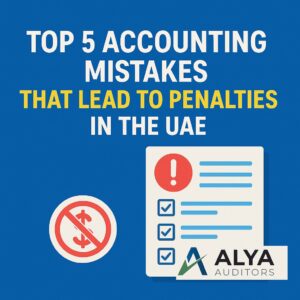
Top 5 Accounting Mistakes That Lead to Penalties in the UAE – 2025 Guide
Top 5 Accounting Mistakes That Lead to Penalties in the UAE In the evolving regulatory landscape of the UAE, businesses must remain vigilant when it
Home » Understanding VAT de-registration, an obligation or an option in the UAE?
A VAT-registered person must mandatorily apply for de-registration:
a)if it stops making ‘taxable supplies’; or
b)if the value of its ‘taxable supplies’ in the previous 12 months, and the value of prescribed supplies/taxable expenses for the next 30 days, is less than Dh187,500
VAT-registered companies which have chosen to freeze their licenses or where the turnover for last 12 months was less than Dh187,500 would generally be required to mandatorily de-register for VAT. De-registration criteria for Tax Group members are separate.
Failure to apply for de-registration within 20 business days attracts a penalty of Dh10,000.
Tax Policy conundrums and impact on Designated Zone Companies
A careful analysis of the VAT Decree Law and the VAT Executive Regulations reveals an interesting dichotomy.
The Decree Law mandates that de-registration must be applied for if the ‘taxable supplies’ were less than Dh187,500. However, the Exec. Regulations provide that FTA will accept the de-registration application only if the ‘supplies referred to in Art.19 of the Decree Law’, or the taxable expenses in the previous 12 months, is less than Dh187,500.
‘Taxable supplies’ only covers standard-rated supplies and zero-rated supplies. However, ‘supplies referred to in Art.19’ is wider in scope. It covers both ‘taxable supplies’ and import of goods/services subject to reverse charge (RCM).
The supplies of goods by Designated Zone companies are generally ‘outside the scope of VAT’. If the value of the taxable supplies reported in their VAT returns of past 12 months is less than Dh187,500, such companies could be required to apply for mandatory de-registration.
A moot tax policy issue arises as submission of an application and acceptance of that application by the authorities are two distinct steps. In fact, the penalty of Dh10,000 is on the failure to submit de-registration application within the stipulated timeframe, the penalty is not on the delay in actual de-registration.
It needs to be clarified whether such companies are expected to apply for de-registration or not, if their ‘taxable supplies’ were less than Dh187,500 even if their taxable expenses or supplies including RCM is more than Dh187,500.
Will Dh10,000 penalty be imposed for failure to apply for de-registration even if the taxpayer knows that FTA would not accept the application as per the Exec. Regulations?
The interplay between voluntary registration and mandatory de-registration results in another practical challenge.
The VAT law allows companies to voluntarily register for VAT if its taxable expenses in the previous 12 months period exceeds Dh187,500 irrespective of the value of its turnover.
What happens if such companies do not generate enough ‘taxable supplies’ in the next 12 months but the expenses continues? Are such companies still required to apply for VAT de-registration and reapply for voluntary registration? And would a Dh10,000 penalty be imposed for failure to apply for de-registration even though the application would be rejected as per the Exec Regulations?
FTA will certainly look into the aforesaid dichotomies and issue appropriate clarifications and/or amend the law to help businesses.
If mandatory obligation to de-register does not apply, a VAT-registered person has an option to de-register if the value of its ‘taxable supplies’ during the past 12 months was less than Dh375,000. Being optional in nature, there is no penalty for late de-registration in such cases.
The team was visibility delighted to have understood the de-registration rules. And just before we concluded the meeting, I couldn’t help but quip “By the way, have you examined the implication of Public Clarification VATP012? Let’s discuss it in our next meeting.”
If your business in DMCC/JLT Dubai and is looking to understand more about the taxes in the country and conduct an audit for your company, then you can take the assistance of Alya Auditors– Chartered Accountants. Alya is a reputed name in the field of Auditing and Accounting and is also a certified firm in almost all the free zones in the UAE including DMCC, DWC, DWTC. We will assess all the needs and requirements of the company and accordingly provide a solution.
For any more details on the services provided by Alya Auditors -Chartered Accountants, feel free to Contact Us. We will be happy to help.
Source : Khaleej Times

Top 5 Accounting Mistakes That Lead to Penalties in the UAE In the evolving regulatory landscape of the UAE, businesses must remain vigilant when it

🛑 ⏳ 31 July 2025 – Last Chance to Avoid AED 10,000 Corporate Tax Penalty in the UAE! 📢 URGENT: 31 July 2025 is Your

Top Audit Firms in Dubai 2025 | Best Audit Companies in the UAE As the UAE’s regulatory landscape evolves, choosing the right audit firm in

The Latest VAT Public Clarification on Cryptocurrency Mining in the UAE The United Arab Emirates (UAE) is a global leader in innovation and technology, including
Where a VAT registered supplier supplies goods or services to its customers but is not paid (wholly or partially) within a specified period, such supplier may be able to adjust the VAT on the bad debts, subject to meeting the conditions prescribed in Article 64(1)1 of the Federal Decree-Law No. 8 of 2017 on Value Added Tax (‘Decree-Law’).
A VAT-registered supplier is generally required to account for output tax in the same tax period in which a tax invoice is issued. This is on the basis that no other event which triggers the date of supply has taken place prior to the date on which the invoice is issued.
If that invoice is not paid and a bad debt situation occurs, the VAT accounted for by the supplier is likely to become a real cost to the business. The Bad Debt relief scheme seeks to provide relief to the supplier in such instances by permitting an adjustment of the VAT charged but not paid by the customer.
a. The goods and services should have been supplied and VAT on the supply should have been charged and accounted for;
b. The consideration for the supply should have been written off in full or in part as a bad debt in the accounts of the supplier ;
c. More than six months should have passed from the date of the supply;
d. The supplier should have notified the customer of the amount of consideration for the supply that has been written off.
If your business in DMCC/JLT Dubai and is looking to understand more about the taxes in the country and conduct an audit for your company, then you can take the assistance of Alya Auditors– Chartered Accountants. Alya is a reputed name in the field of Auditing and Accounting and is also a certified firm in almost all the free zones in the UAE including DMCC, DWC, DWTC. We will assess all the needs and requirements of the company and accordingly provide a solution.
For any more details on the services provided by Alya Auditors -Chartered Accountants, feel free to Contact Us. We will be happy to help.

Top 5 Accounting Mistakes That Lead to Penalties in the UAE In the evolving regulatory landscape of the UAE, businesses must remain vigilant when it

🛑 ⏳ 31 July 2025 – Last Chance to Avoid AED 10,000 Corporate Tax Penalty in the UAE! 📢 URGENT: 31 July 2025 is Your
Truly, let us know what service you are looking for and hence we can get back to you with more details.
Silver Tower, Business Bay. PO Box: 41102, Dubai, UAE.
Sharjah Airport Free Zone PO Box: 120403 Sharjah, UAE.
+971 48769377
+971 52 9750690 , +971 50 522 1035
Mon – Fri : 8:30 AM – 6 PM
Saturday – 9 AM – 5 PM
Sunday – Closed
© Alya Auditors 2022 All Rights Reserved